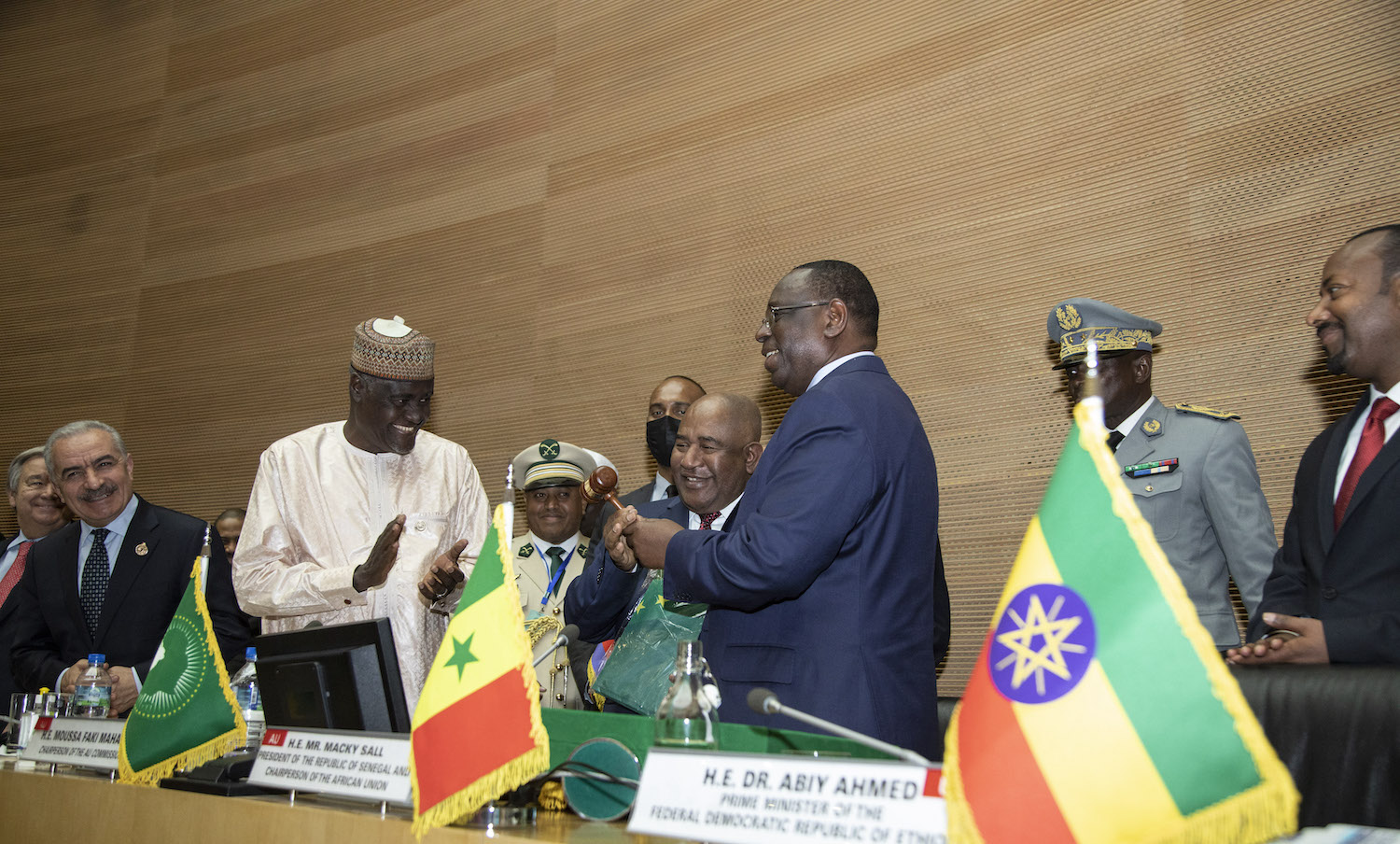African Heads of States met in the Ethiopian capital Addis Ababa to discuss an array of challenges during this year’s AU Summit.
In the two-day summit, the leaders were challenged to sustain minimum economic growth between 7-10 per cent levels of Gross Domestic Product (GDP) to achieve inclusive growth and sustainable development on the continent.
This is according to the Africa Union Commission Chairperson Moussa Faki Mahamat and African Development Bank (AfDB) president Dr. Akinwumi Adesina who spoke on the sidelines of the AU Summit in Addis Ababa, Ethiopia.
What’s more, the policy makers worry that the continent is way behind efforts to eradicate poverty, as enshrined in the AU’s Agenda 2063.
“Africa’s current growth performance is insufficient to eradicate poverty and achieve the Sustainable Development Goals (SDGs) and Agenda 2063 as encapsulated in the African Development Bank’s ‘High 5’ priorities,” said Acting Chief Economist and Vice President of AfDB, Prof Kevin Urama.
United Nations delegate at the summit Hanan Morsy said Africa needed macro-economic stability.
“The continent must scale up the production value chain, not just export raw materials,” said Morsy, the Deputy Executive Secretary and Chief Economist at the UN Economic Commission for Africa.
Financial commitment
For a step forward for the development agenda on the continent, Algerian President Abdelmadjid Tebbounce announced Sunday that his country would donate a whopping $.1 billion to finance development projects across the continent.
“I have decided to inject one billion US Dollars for the benefit of the Algerian Agency of International Cooperation for Solidarity and Development to finance development projects in African countries,” read his speech in part.
Algeria boasts of her strong financial muscle owing to its vast natural gas – the country is Africa’s top gas exporter.
Costly Loan Feature in AU Summit
Kenya on the other hand, accused the global financial institutions of mistreatment and unfair interest rates on climate change, despite contributing less in terms of global gas emission.
Kenya’s President William Ruto in an interview with Al Jazeera, slammed the multilateral lenders for issuing favourable loan terms to the global north against the global south – specifically the African continent.
“The multilateral financial institutions and the entire financial system is unfair. We do not want a financial institution that favours us, we want a fair one.
All sovereign African states that have gone to international markets are paying anywhere around 10%, our compatriots in the global north anywhere between 0.001 % – that is not fair,” said Ruto.
Energy transition also topped the agenda, when civil society groups cautioned African leaders against fossil-fuel expansion projects on the continent.
Kenya is intending to start coal mining at the coastal belt and in Kitui County. Uganda on her part, has plans underway for oil extraction.
Climate change effects
According to AfDB, the growing frequency and persistence of climate-related disasters is costing African states about $7 billion to $15 billion a year, with fear that it is likely to hit $50 billion annually by 2030.
“African countries need to raise an annual average of $124 billion to adapt. As of today, they’re getting roughly $28 billion a year, he told Devex.
The money isn’t there for them to be able to adapt to climate change,” said AfDB President Akinwumi Adesina.
At the AU Summit, Adesina said nine out of the 10 most vulnerable countries to climate change are in sub-Saharan Africa. These countries need about $600 billion through 2030, which, he said, amounts to about $60 billion annually. Yet, they are only receiving roughly $18 billion a year toward this effort.
“You can see the big gap,” Adesina said. “We need to accelerate access to climate adaptation finance for African countries.”
African Heads of States also agreed on a plan to revamp routine immunization across the continent under “Building Memorandum for routine immunization recovery in Africa”.
Africa vaccine-preventable diseases are responsible for 93 percent of ongoing infectious diseases outbreaks currently in 31 African states, with 17 having more than one vaccine-preventable disease outbreak
“Children who missed immunization services are more likely to also experience limited or no access to health, nutrition, education and other social events,” said Marie-Pierier, UNICEF Regional Director for West and Central Africa.
Free trade agreement
The leaders agreed to fast-track the implementation of the African Continental Free Trade Area (ACFTA) to ease trade barriers on the continent and unlock its vast potential.
According to the UN, Africa has a combined GDP of $3.4 trillion and the bloc boasts of 1.3 billion people.
The summit in Addis Ababa focused on accelerating the ACFTA.
“In 2023, the AfCFTA Guided Trade shall also focus on Trade in Services in the five priority areas, namely: Tourism, transport, Business Services; Communication Services; Financial Services; Transport Services, and Tourism and Travel-related Services.
The ultimate objective is to ensure that AfCFTA is truly operational and the gains from the initiative are improved implementation in order to achieve increased inter-regional and intra-Africa trade that would yield economic development for the betterment of the continent at large,” read a statement by the African Union.


